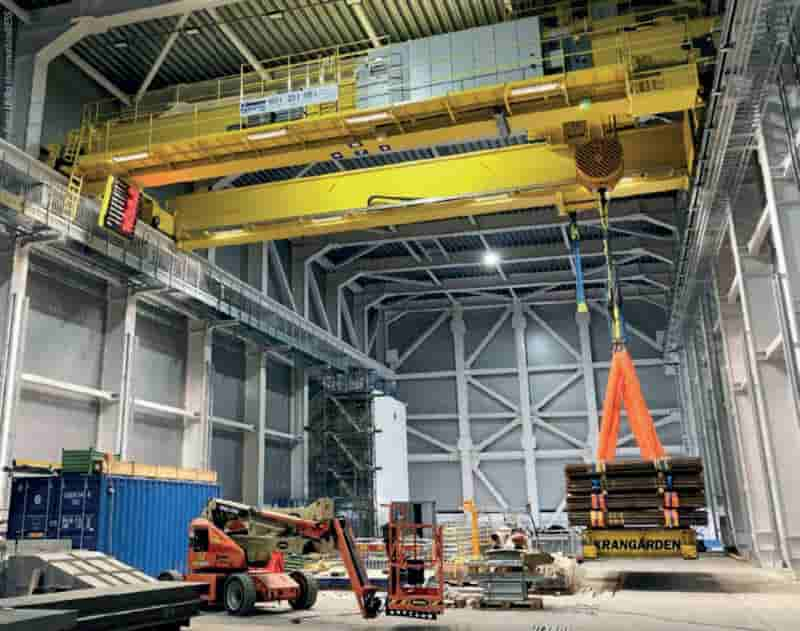ESS neutron facility brings the expertise of 13 European countries together to enhance research and innovation. Jenny Eagle reports.
International research facility ESS, (European Spallation Source) neutron facility, in Lund, Sweden, has hired Henning Larsen and COBE architects to create a multi-disciplinary research environment, due to be operational by 2027.
- Dematek has supplied one overhead crane to the ESS facility.
The task to deliver a facility with 15 installed instruments and a capability of 2MW of proton beam power, will enable scientists to study materials on an atomic and molecular level and benefit a variety of research fields such as life and environmental science, energy, materials, and archaeology.
Following completion of the civil construction works, the facility will now be prepared for research and the architects have partnered with Munck Cranes and Dematek to house a steel structure which will cope with complex operational requirements and maximize flexibility.
“Dematek signed an agreement with Skanska in 2019 for the delivery of a crane to the ESS research facility. The instruments at the plant can be compared to huge microscopes that make it possible to study materials at the molecular and atomic level. ESS’s unique achievements will mean completely new and unsurpassed research opportunities for researchers from around the world, in areas such as materials, health, transport and energy,” said Fredrik Wollmér, sales, Dematek.
“The crane that Dematek has installed will operate in the centre of the facility by lifting equipment to the target station, where the neutrons for research are generated. The crane was built and assembled at a factory owned by its supplier, Siempelkamp and is equipped according to the German nuclear power standard for lifting equipment, KTA3902.”
According to Thomas Henriksson, project manager, Dematek, not many manufacturers of lifting equipment in Europe meet these requirements. He said working with its supplier Siempelkamp, enables them to deliver customised cranes that meet all criteria.
The crane’s maximum load is 115 tons and is supplemented with an angle trolley, auxiliary lift of 20 tons, which hangs on the side to reach out to the end wall in the room. The crane’s span is 19.5 metres and the lifting height will be 28 metres.
Buro Happold’s structural design has large open spans to cover the Target building and associated Experimental Halls. Due to strict criteria by the regulatory authorities, the steel structure must conform with elements such as supporting up to 7m of snow on portions of the roof and be shockproof in case of earthquakes.
Four operating overhead cranes, supplied by Munck and Dematek, provide operational flexibility to the building. The crane in the central target building meets particularly high safety standards as it is required to transport heavy components and sometimes activated material resulting from the spallation process: It can lift 115 tons – the weight of a Boeing 787.
The building’s outer structure is designed to cope with internal forces and movement caused not only by individual cranes but many loading scenarios created when all cranes are in operation simultaneously.
Adam Pekala, project leader at Buro Happold explains: “The cladding of the overhanging roof is clad in L-shaped aluminium lamellas mounted onto panels. “The nature of these panels prevents detrimental snow accumulation on the overhang, reducing the total load acting on the large overhangs. We used parametric modelling to define the optimum shape and layout of the panels and reduced the number of bespoke assemblies by 87%. This helped to minimise wastage by using materials and production resources in a more sustainable way, whilst enabling much faster fabrication and assembly.”
Mark Bakelaar, MD, Munck Cranes, added: “ESS is indeed a special project and we have delivered three customised overhead cranes, with the last two being delivered next month.”
Four operating overhead cranes to ESS, supplied by Munck and Dematek
没有评论:
发表评论